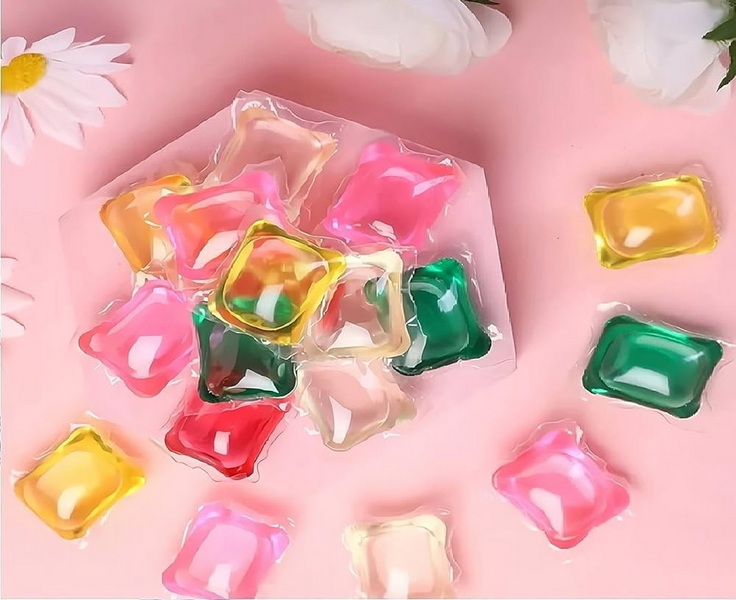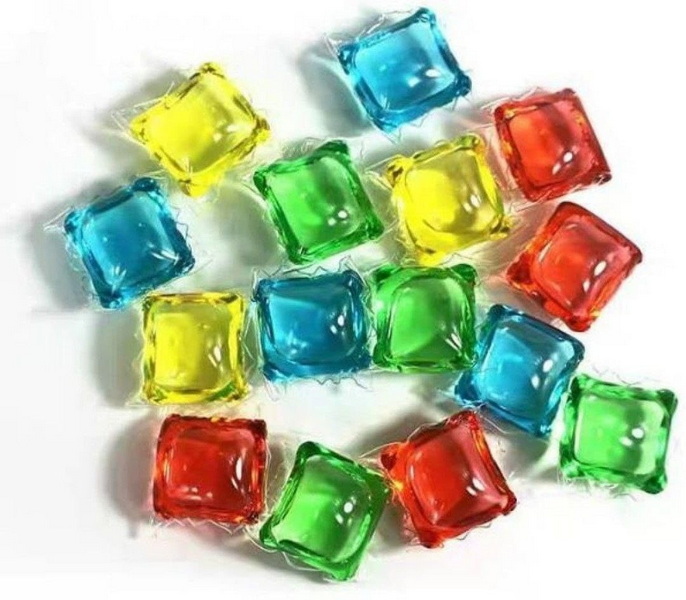Dongguan UFine Daily Chemical Co.,Ltd.
- All
- Product Name
- Product Keyword
- Product Model
- Product Summary
- Product Description
- Multi Field Search
Views: 222 Author: Tomorrow Publish Time: 10-27-2025 Origin: Site











Content Menu
● What Is a Laundry Detergent Pod?
● Typical Amount of Detergent in a Laundry Pod
● Composition of Laundry Detergent Pods
● Why Is Detergent Concentration Important?
● How Detergent Quantity Affects Washing Loads
● Additional Considerations for Detergent Pods
● Advantages of Pre-Measured Detergent Amounts
● Potential Drawbacks of Fixed Detergent Amounts in Pods
● Environmental Considerations
● Usage Guidelines for Maximum Efficiency
● How To Handle Spills and Detections
● FAQ
>> 1. How much detergent is in one laundry pod?
>> 2. Can I use more than one pod for a larger load?
>> 3. Where should I place the pods in the washing machine?
>> 4. Do pods dissolve in cold water?
>> 5. Are laundry detergent pods safe for children?
Laundry detergent pods have revolutionized the way people do laundry by offering a convenient and pre-measured solution. However, many consumers wonder: how much laundry detergent is actually contained in each pod? This article explores the components of laundry pods, their detergent content, usage guidelines, effects on washing efficiency, and safety considerations. By understanding these details, consumers can make informed decisions about using laundry detergent pods effectively.

A laundry detergent pod is a small, pre-measured packet containing concentrated detergent, enzymes, and other cleaning agents. It is designed to dissolve in water during the wash cycle, releasing its contents to clean clothes. Pods are popular due to their ease of use, no-measurement requirement, and reduction in mess and spills compared to liquid or powder detergents.
The exact amount of detergent inside a laundry pod varies by brand and formulation, but on average, a single pod contains about 1.0 to 1.5 fluid ounces (approximately 30 to 45 milliliters) of concentrated detergent. This equates roughly to the amount of detergent recommended for a standard load of laundry when using other forms of detergent.
Manufacturers design pods to deliver the optimal amount of detergent for one average load, which helps prevent overuse and wastage. The detergent inside is highly concentrated, allowing pods to be smaller than traditional detergent doses while remaining effective.
Pods typically contain several components within a water-soluble film, including:
- Surfactants: These are the cleaning agents that break down and remove stains and dirt from fabrics.
- Enzymes: Biological agents that target protein, starch, and fat stains for enhanced cleaning.
- Builders: Chemicals that soften water and enhance surfactant efficiency.
- Bleaching agents: Optional ingredients for whitening or disinfecting.
- Fragrances and additives: For scent and fabric care.
The water-soluble film dissolves quickly in water, ensuring detergent release at the right time in the wash cycle.
Pods contain concentrated detergent formulas as compared to traditional liquid or powder detergents. This concentration allows for smaller dosage volumes within compact pods without sacrificing cleaning power. The advantage includes space-saving packaging and reduced shipping weights.
Because pods dispense a fixed amount of detergent, users do not need to measure, reducing the risk of using too much detergent, which can lead to residue on clothes or washing machine damage.
The typical pod is calibrated to clean a standard load of laundry, usually around 5 to 7 kilograms (11 to 15 pounds). Using one pod per load ensures enough detergent to handle the average volume of dirt and stains.
For larger or heavily soiled loads, some brands suggest using two pods. However, this can result in excess detergent, causing excessive sudsing or residues. Conversely, using less than one pod for smaller or lightly soiled loads can save product and avoid over-cleaning.
- Water hardness: In areas with hard water, a pod might be less effective unless the formulation includes water-softening agents.
- Temperature: Cold water washes generally work well with pods, but very cold water or short cycles can hinder complete dissolution for some formulations.
- Machine compatibility: Front-load washers often use less water and rely on correct dispensing; pods are designed to work across most machine types, but following manufacturer recommendations is prudent.
- Fabric care: Some pods include dyes or brighteners that may affect sensitive fabrics; choose a formula appropriate for delicates or wool if needed.

- Convenience: No need to measure detergent, minimizing time and effort.
- Portability: Easy to store and carry pods, especially for travel or laundromats.
- Consistent results: Fixed detergent amounts help achieve predictable cleaning performance.
- Reduced waste: Helps avoid overdose which can harm fabrics or machines.
While pods are convenient, one-size-fits-all dosing may not suit every load:
- Small or delicate loads may receive too much detergent.
- Very dirty or bulky items may require additional pods.
- Pods cost more per load than liquid or powder detergents in bulk.
- If pods do not dissolve fully due to water temperature or mechanical issues, detergent may not disperse properly.
The detergent and the soluble film material in pods are designed to be biodegradable. However, consumers should follow washing guidelines to ensure pods dissolve completely and minimize environmental impact. Some environmental concerns include the potential for microplastics from packaging, though many brands have moved toward more recyclable or dissolvable film options.
- Use one pod per standard load unless the label indicates otherwise.
- Place the pod in the drum before adding clothes to ensure even dissolution.
- Do not place pods in the detergent drawer, which can impede dissolution.
- Avoid overloading the machine, which can prevent proper distribution of the pod contents.
- Choose a pod formulation that matches load size, soil level, and fabric type.
- If in doubt, consult the product's care label or manufacturer guidance for best practices.
Laundry pods contain concentrated chemicals and can pose risks if ingested or handled improperly. Keep pods out of reach of children and pets. Avoid puncturing the pod or exposing it to moisture before use. If a pod leaks, clean up immediately and wash hands thoroughly.
In case of exposure or ingestion, seek medical attention promptly and provide product packaging information to healthcare professionals. For households with small children, consider using locked storage or replacing pods with alternative detergents if safety concerns prevent proper storage.
If a pod breaks or leaks, wipe the surface immediately and rinse with clean water. If skin contact occurs, wash with soap and plenty of water. When a pod is accidentally ingested, contact poison control or emergency services immediately.
Ongoing innovations aim to improve dissolution speed, minimize residue, and enhance fabric care. Researchers explore biodegradable, plant-based surfactants with reduced environmental impact, as well as packaging that is even more space-efficient. Industry players also investigate smart laundry systems that could tailor dosing to load size via sensors or connected devices.
Each laundry detergent pod contains approximately 1.0 to 1.5 fluid ounces of highly concentrated detergent formulated to clean one average laundry load effectively. Pods offer convenience, precise dosing, and effective cleaning in a compact form. However, users should select the number of pods carefully based on load size and soil level to avoid detergent underuse or overuse. With proper use and precautions, laundry pods provide an efficient, mess-free laundry experience.

Each pod typically contains about 1.0 to 1.5 fluid ounces (30-45 ml) of concentrated detergent.
Yes, for very large or heavily soiled loads, two pods may be used, but avoid excess to prevent residue.
Place the pod directly in the drum before adding clothes, not in the detergent drawer.
Most pods are designed to dissolve in cold water, but very cold water or short cycles may affect dissolution.
Pods are highly concentrated and can be harmful if ingested. Keep pods out of reach of children at all times.